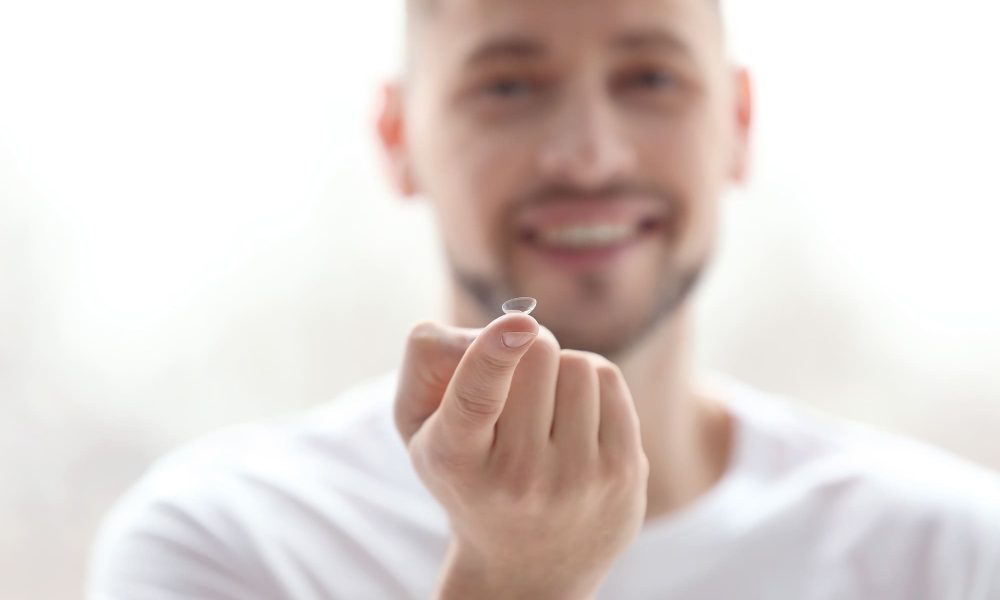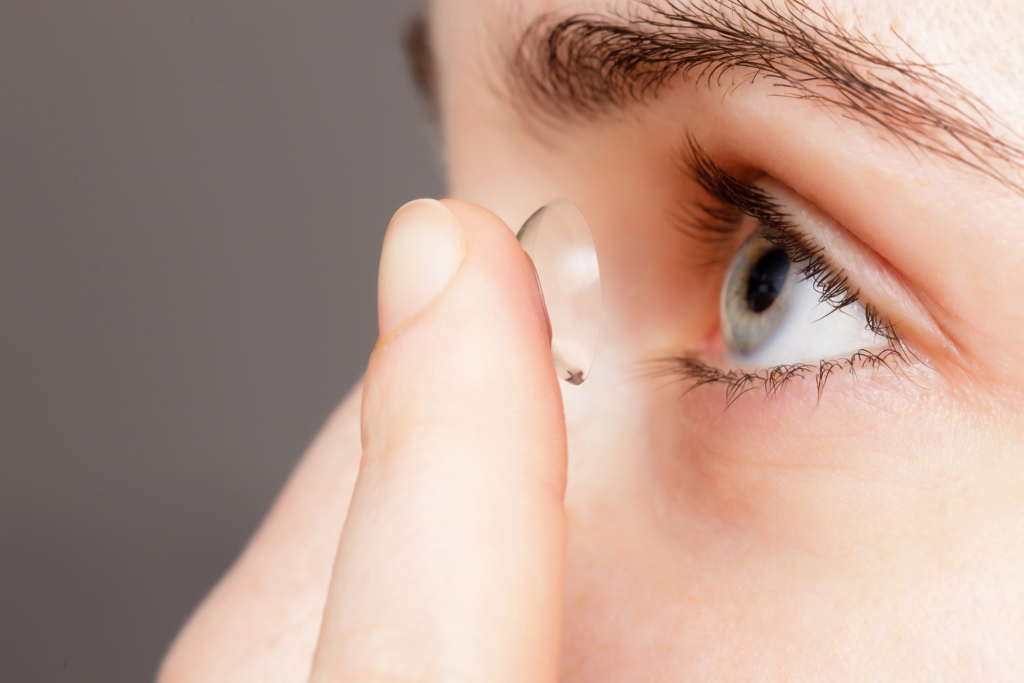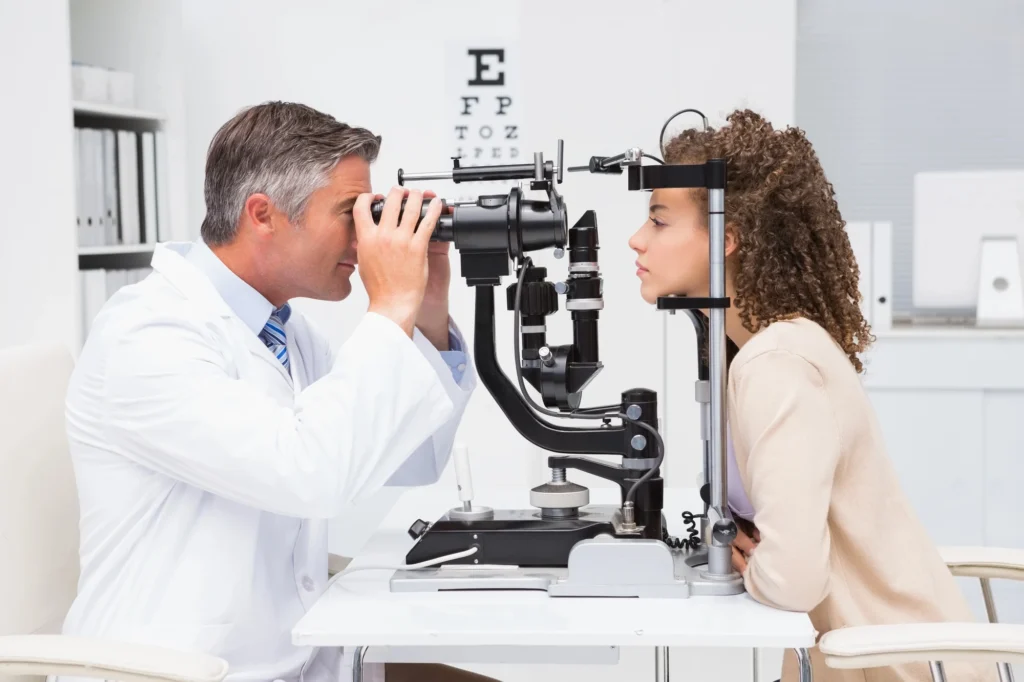You recently switched to wearing contact lenses – congratulations! You’ve joined the ranks.
Did you know an estimated 45 million people in the US are contact lens wearers?
It’s pretty clear why since contact lenses allow people to have better vision without changing their appearance. It makes everyday life tasks like exercising much easier.
But being new to contact lenses is an adjustment, and can be a scary one at that. Continuing to wear contact lenses gets easier with time and with confidence.
Read below for the 7 important tips to remember when wearing contacts for the first time, and you’ll be informed and prepared for this process!
1. How to Find the Perfect Contact Lenses
Finding the perfect contact lenses starts with a thorough eye examination by an eye care professional. Your eye doctor will evaluate your eyes and discuss your lifestyle, vision needs, and preferences. This assessment will help determine whether you need daily, bi-weekly, or monthly lenses, as well as whether soft or rigid gas permeable lenses are the best choice for you.
To ensure your lenses are the right fit:
- Consult Your Eye Doctor: They will recommend lenses that match your vision needs and eye health.
- Consider Your Lifestyle: Active individuals may prefer daily disposable lenses, while those who prefer long wear might opt for extended wear lenses.
- Evaluate Comfort and Vision Quality: Trial different brands or types to find the most comfortable fit with clear vision.
2. Understanding Your Contact Lens Prescription
Your contact lens prescription is not the same as your glasses prescription. It includes specific measurements for the curvature, diameter, and power of the lens. Ensuring that your prescription is accurate and up-to-date is crucial for comfort and effective vision correction.
3. How to Clean and Care for Your Contact Lenses
Proper cleaning and care of your contact lenses are essential to prevent eye infections and ensure the longevity of your lenses. Here’s how to maintain them:
- Clean Lenses Daily: Use the recommended lens solution to clean, rinse, and store your lenses each day. Avoid using tap water or saliva, as these can introduce harmful bacteria.
- Replace Solution Daily: Always use fresh solution when storing your lenses. Do not “top off” old solution.
- Clean Your Lens Case: Rinse the case with lens solution, let it air dry, and replace it every three months.
4. Practice Good Hygiene When Handling Contacts
Good hygiene is vital to prevent infections and maintain eye health:
- Wash Hands Thoroughly: Before handling your lenses, wash your hands with soap and water, then dry them with a lint-free towel.
- Use the Right Solution: Stick to the lens solution recommended by your eye doctor, as different solutions can have different properties.
- Avoid Touching Eyes with Unclean Hands: This prevents the transfer of bacteria and other harmful particles to your eyes.
5. The Importance of Following a Wearing and Replacement Schedule
Your eye doctor will provide a wearing schedule tailored to your lenses. Whether you’re using daily, bi-weekly, or monthly lenses, it’s crucial to adhere to this schedule to avoid discomfort and potential eye issues.
- Don’t Overwear Lenses: Stick to the recommended wearing time and avoid sleeping in lenses that are not designed for overnight use.
- Replace Lenses as Directed: Even if your lenses feel fine, they should be replaced according to the schedule to prevent protein buildup and other complications.
6. Stay Hydrated and Keep Your Eyes Moisturized
Dry eyes can be a common issue for contact lens wearers, especially in dry or air-conditioned environments. To keep your eyes comfortable:
- Stay Hydrated: Drink plenty of water throughout the day.
- Use Re-Wetting Drops: If your eyes feel dry, use re-wetting drops that are compatible with your contact lenses.
7. Avoid Common Mistakes and Protect Your Eyes
Avoiding common mistakes can help protect your eyes and extend the life of your lenses:
- Never Sleep in Contacts: Unless they’re designed for overnight wear, sleeping in contacts can increase the risk of eye infections.
- Avoid Wearing Lenses in Water: Remove your lenses before swimming, showering, or using a hot tub to prevent exposure to harmful microorganisms.
FAQs: Common Questions About Contact Lenses
How do I find the perfect contacts?
Start with an eye exam and consultation with your eye doctor. They’ll help you choose lenses based on your prescription, lifestyle, and comfort preferences.
How do you know which contacts are best for you?
Your eye doctor will recommend the best contact lenses for your specific vision needs. You can also try different types and brands to see which feels most comfortable and provides the clearest vision.
How do I make sure my contacts are right?
Ensure your contacts are the right fit by following your doctor’s guidance, keeping up with regular eye exams, and paying attention to how your eyes feel while wearing the lenses.
What is the best way to clean contact lenses?
Use a multipurpose contact lens solution to clean, rinse, and store your lenses daily. Avoid using water or saliva, as these can introduce harmful bacteria.
How often should I clean contact lenses?
Clean your contact lenses every time you remove them. Also, replace your lens case every three months to prevent bacterial buildup.
Can I wear normal contact lenses with astigmatism?
Standard contact lenses may not provide the necessary correction for astigmatism. Toric lenses are designed specifically for this condition and provide the correct vision correction.
Your Eye Health Is Important
Taking care of your eyes also means regularly visiting your eye care doctor.
In addition to getting an annual eye exam, make sure you regularly assess the right lens brand for you and your needs. If you start off using contacts only on special occasions or every few days, but then begin to wear them more regularly, you may need to switch the type of lenses you use.
Wearing contacts for the first time can cause anxiety, but following the tips above will ease this process. Schedule an appointment with us today to get fitted for contacts and discuss the right type for you!





